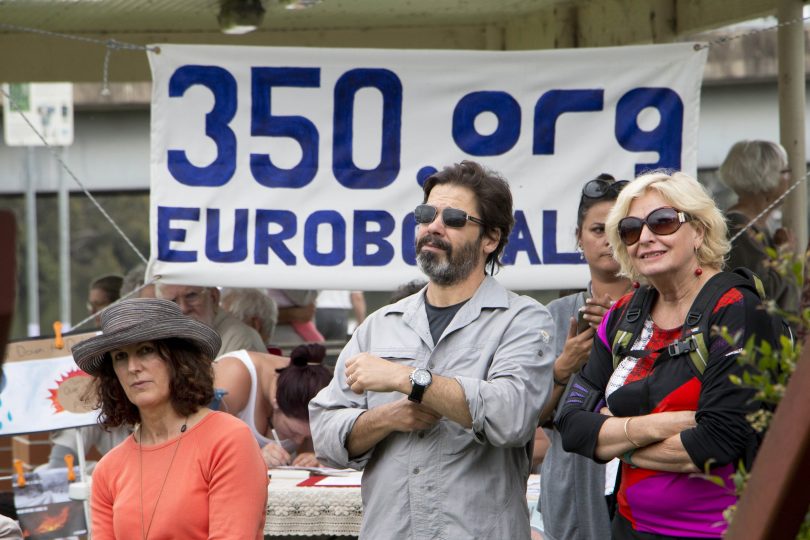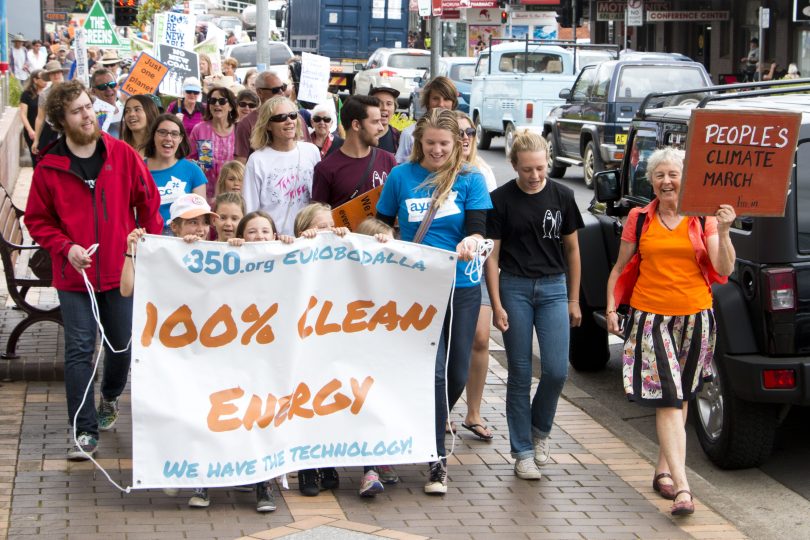
Reverend Linda Chapman, left, with fellow members of climate change action group 350Eurobodalla. Photo: Supplied.
A Mossy Point local who, last Wednesday, attended a royal commission community forum into the bushfires in Batemans Bay during the recent summer says the commission is reactive, not proactive, and does not take into consideration the wider context of a changing climate.
“It is disappointing that the Royal Commission into National Natural Disaster Arrangements will not include the role of climate change in contributing to the bushfires of 2019-2020 and beyond in an explicit way,” says Reverend Linda Chapman, who represented climate change action group 350Eurobodalla at the forum, which was also attended by Coastwatch, the National Parks Association of NSW, the NSW Rural Fire Service and Eurobodalla Shire Council.
The royal commission acknowledges that climate change had a role in the fires, but has no apparent plans to address it, claims Linda. “It’s like we have cancer and an infection and the government only wants to treat the infection but is ignoring the cancer.”
According to Linda, the NSW Rural Fire Service is trying to do its job and reduce fuel loads with seasonal hazard reduction burns, but it is fighting a hotter, drier climate.
“The change to the bush is so great that areas which burnt recently are burning again. The effects of climate change mean that hazard reduction burns are only effective to a certain point because we have longer, hotter seasons.”
The consensus among local firefighters is that “nothing was going to stop those fires once they got going,” says Linda, who adds the only way we can prevent it happening again is to focus on reducing our greenhouse gas emissions.
350Eurobodalla is a local chapter of global movement 350, which is named for the targeted parts per million of carbon in the atmosphere. The South Coast group would like to see the Federal Government declare a climate state of emergency.

A 350Eurobodalla climate action rally held in Moruya in March 2019. Photo: Supplied.
“Right now, we have about 415 parts per million of carbon and we can’t do much about what’s in the atmosphere,” says Linda. “What we can do is take immediate steps to reduce our output and, to some extent, focus on drawdown via reforestation.”
The government is blatantly ignoring scientific advice delivered as early as 2009, which could have lessened the impact of this year’s fires, says Linda.
“In 2009, the Garnaut [Climate Change] Review warned that rising emissions would lead to extreme bushfires, and that would be apparent by 2020. In April last year, the Federal Government was warned to prepare for extreme fires, with emergency leaders asking for more water-bombing aircraft, but no action was taken.”
The rapid spread of COVID-19 and its devastating impact on the local economy is now the immediate issue at hand, impacting people and businesses already at risk following the fires, however 350Eurobodalla warns of the long-term dangers of continuing to cast aside climate change.
It’s not too late to make a written submission to the Royal Commission into National Natural Disaster Arrangements, or call 1800 909 826 to make a submission by phone. Submissions close Friday 3 April 2020.







